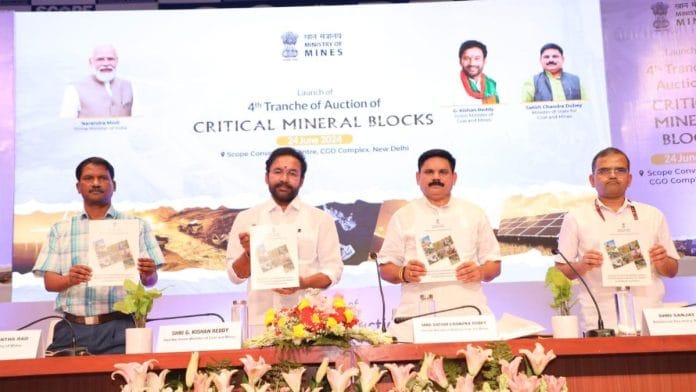New Delhi: Kolkata-based Maiki South Mining Pvt Ltd, a company incorporated three years ago, was awarded the lithium and Rare Earth Element (REE) block in Chhattisgarh’s Katghora — the first in the country to be auctioned — at an auction premium of 76.05 percent, Union Minister For Coal and Mines G. Kishan Reddy announced Monday.
Reddy also launched the fourth tranche of auction of 21 critical and strategic minerals blocks spread over eight states. Of these, 11 are fresh blocks of graphite, glauconite, phosphorite, potash, nickel, PGE, phosphate and REE spread over six states. The remaining 10 are from previous tranches of auction, said Kantha Rao, Secretary (Ministry of Mines).
The 21 blocks are valued at an estimated Rs 83,000 crore.
The Katghora block was among the two lithium blocks put up for auction in November 2023, when the central government launched the country’s first-ever auction of 20 blocks of critical minerals. The auction of the other lithium reserve, located in Salal-Haimna in Reasi district of Jammu and Kashmir, was cancelled since it did not find any takers.
Lithium and REE are key components in the manufacturing of mobile phones, laptops, LED monitors, electric vehicles, aircraft components, vehicle components, solar panels, semiconductors and wind turbines.
The lithium block at Katghora is a composite licence block, which means that a G4-level survey (reconnaissance) has been conducted, Rao said at a press briefing which following the launch event Monday. “The detailed survey will be done by the bidder. The bidder will do a lot of exploration before establishing what is the reserve. But our preliminary report says that there is a commercially viable quantity of lithium there,” he added.
Besides the two lithium reserves, the remaining 18 blocks auctioned in the first tranche contained critical minerals such as molybdenum, glauconite, chromium, lithium, nickel, potash, and phosphorite, among others.
However, the response from the private sector was lacklustre, forcing the ministry to annul the auction of 13 of the 20 blocks. Of the remaining seven, Reddy announced bidders for six, including the Katghora reserve.
The other bidders, who were awarded minerals blocks Monday under the first tranche included Agrasen Sponge Pvt Ltd, which got a graphite and a manganese block in Odisha, Kundan Gold Mines Pvt Ltd, which bagged a graphite reserve in Odisha, Dalmia Bharat Refractories Ltd, which got a graphite block in Tamil Nadu, and Sagar Stone Industries, which was awarded a phosphorite block in Uttar Pradesh.
Of the six blocks for which preferred bidders were announced Monday, the value of three (two blocks in Odisha and one in Uttar Pradesh) has been assessed and estimated at around Rs 3,200 crore, said Rao.
Also Read: SC bans use of explosives for mining within 5 km of Chittorgarh Fort, orders impact assessment study
Lukewarm response so far
Though the move to auction critical mineral reserves is welcome considering the importance of such minerals in ensuring India’s energy security and transition to clean energy, the response from the industry has been tepid.
While the auction of 13 of 20 minerals blocks launched in November 2023 was cancelled due to poor or no response, the auction of 14 of 18 blocks in the second tranche in February 2024 was annulled for the same reason.
In the third tranche, seven critical minerals blocks were put for auction in March 2024. All were from the first tranche.
A ministry official said it’s too early to talk about the kind of response this would garner.
But Rao said Monday that the government is “hopeful of a good response”.
He added, “We will intensify our road shows and we will try to convince the industry that some of the blocks, which have not been picked up, are actually good blocks.”
Such minerals are essential not only in high-tech electronics and telecommunications, but also in transport and defence. Earlier, state governments were responsible for auctioning minerals blocks. But amendments to the Mines and Minerals (Development and Regulation) Act, 1957, in August 2023 empowered the central government to auction critical minerals.
The amendments also paved the way for private commercial mining of six critical minerals — lithium, beryllium, niobium, tantalum, titanium and zirconium — and deep-seated minerals like gold, silver, and copper.
Earlier, only government agencies were allowed to explore and mine these minerals.
Rao said that at present reports on about 100 critical minerals blocks are with the ministry. “We are studying these reports and on the basis of the commercial viability of some of these, they will be put up for auction in tranches,” he added.
Talking to reporters after the launch of the fourth tranche of auction, Reddy announced that the government will also auction the first tranche of 10 offshore critical minerals blocks within the next 100 days. He underlined that the auction of critical minerals blocks is a step in the right direction. “India imports 90 percent of its critical minerals. Our target is to increase domestic production and at a later stage start exporting such minerals,” he said.
(Edited by Amrtansh Arora)






